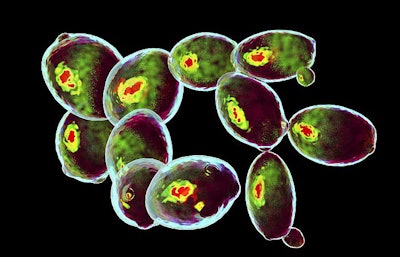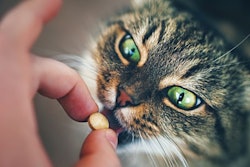
A team of researchers at the Federal University of Paraná, Brazil evaluated the effects of yeast probiotics on diet digestibility, fermentative metabolites, and fecal microbiota on dogs following a change in diet.
“Our results suggest that live Saccharomyces cerevisiae supplementation may improve indicatives of gastrointestinal functionality in dogs, by reducing the fecal concentration of some nitrogen fermentative catabolites and increasing the overall fecal concentration of butyrate, regardless of the diet,” the scientists wrote in the journal Microorganisms.
In the experiment, eight dogs received live yeast probiotics, while another eight did not. The yeast probiotics contained 0.12 grams per dog per day of live Saccharomyces cerevisiae yeast. All 16 dogs ate a lower protein and fiber diet for 21 days. The scientists then switched the dogs to a higher protein and fiber diet until 49 days had elapsed.
While yeast supplementation did not statistically influence diet digestibility, the probiotic group had a lower fecal concentration of total biogenic amines on both diets, along with less ammonia in their feces while on the lower protein and fiber diet. The dogs in the probiotic group also had lower aromatic compounds and a higher fecal concentration of butyrate, a chemical produced when beneficial bacteria break down fiber in the colon.
The probiotic group had a higher abundance of the desirable bacteria Bifidobacterium and Turicibacter, and a lower abundance of Lactobacillus and E. coli.
“In addition, the live yeast supplementation also seems to modulate the gut microbiota and its functions, favoring eubiosis and gut homeostasis and reducing potential pathogens, such as E. coli,” the scientists wrote. “Considering these results, the supplementation of S. cerevisiae as a probiotic in commercial dog food may contribute to health benefits for these animals.”
Nevertheless, the researchers noted that more studies with larger numbers of dogs would be need to confirm the results.
Probiotics may help gut-brain axis to boost pet wellness
The study published in Microorganisms adds to a growing body of research on probiotics. Other research suggests that the health of an animal’s digestive system correlates to their psychological and physical well-being.
For example, researchers studied the effects on dogs of diet supplementation with probiotic bacteria, Bifidobacterium longum. The scientists observed that the probiotic seemed to have an anxiolytic, or anxiety reducing, influence on the dogs. Following probiotic supplementation, 90 percent of dogs improved their day-to-day anxious behavior, including a reduction in barking, jumping, spinning and pacing when compared a placebo supplement.
Probiotics used in the pet food industry primarily are either bacteria from the Lactobacilli and Bifidobacterium species or yeast, such as Saccharomyces cerevisiae boulardii. These same species appear in human probiotic supplements, which have grown in popularity over the past few decades.

















